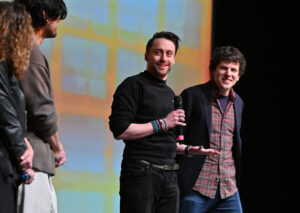Jessica Buzzard
Seven million people live in Hong Kong, an area that’s just half the size of Rhode Island. The waterfront skyline is a mashup of skyscrapers and mountains. The humidity makes the air heavy and still. Neon lights – whether running along the sides of gigantic buildings or shining in shop windows – are everywhere you look. And so are the people – Chinese, Filipino, Indonesian, Sri Lankan, Indian, expat bankers from the Western Hemisphere, and too many others to list. So, when our flight landed with a handful of staff and filmmakers to present the Sundance Film Festival – Hong Kong Selects to “Asia’s World City,” we didn’t know what to expect.
Also unpredictable was the audience response to the program of films, filmmaker discussions, live music, and events. We presented films ranging from Skeleton Twins (with Kristin Wiig and Bill Hader as siblings who share both humor and pain) to Fishing Without Nets (an account of a Somali man who turns to piracy to survive) to The Case Against 8 (the documentary account of two gay couples appealing California’s Proposition 8 to the Supreme Court). Infinitely Polar Bear, Life After Beth, Wish I Was Here, and God Help the Girl rounded out the eclectic program. And without exception, the theatres were full and the audiences were delighted.
The spirit of the series was evident during a panel discussion that brought Hong Kong filmmakers and film lovers together with the featured filmmakers, Sundance Film Festival director John Cooper, and series manager Bede Chang. What follows is a summary of questions from the audience and paraphrased answers from the filmmakers. And while the words of wisdom shared may have a familiar ring, The Case Against 8 co-director Ryan White acknowledged that friendly reminders are always a good thing. “We should all remind each other of this advice as we go on,” he said. “Even for established filmmakers, it’s too easy to forget!”
What is Your Advice for Getting Started?
Don’t talk yourself out of it. Keep your foot on the gas. Don’t get scared of what you don’t know. –Maya Forbes, Infinitely Polar Bear
The bad news is that it’s going to be harder than you think it’s going to be. The good news is that you can figure it out. –Ben Cotner, The Case Against 8
There is no one way to start. I made a lot of short films that were not very good, actually. Finding a community is really important – finding those people whom you like and respect and you want to work with is a big deal. Build your tag team and embrace the collaborative nature of it…you get to lead and inspire your gang. –Craig Johnson, The Skeleton Twins
How Does Casting Affect Your Film?
How Does Casting Affect Your Film?Don’t rush too much to make the film – remember that you’re telling a story about people. So much of documentary filmmaking is about managing personal dynamics. Sometimes it’s about knowing when not to film in order to support your subjects through the experience. –Ryan White, The Case Against 8

With a known actor, it’s easier to access financing and you can get your film made. And it’s your job to make other talented people fall in love with your project. Actors are looking for roles with depth and authenticity, and those roles are not as easily found in the studio world. All of this being true, the most important thing is to cast for the character – sometimes the most famous actor is not right for the role. –Maya Forbes, Infinitely Polar Bear
What is the most challenging thing about transitioning from short to feature-length?
Realizing that your job becomes more about inspiring and motivating a bigger group of people around your story. –Cutter Hodierne, Fishing Without Nets
Editing is a much bigger challenge with a feature. –Craig Johnson, Skeleton Twins
We shot for five years and amassed 600 hours of footage. So yes, editing was a challenge. –Ben Cotner, The Case Against 8




